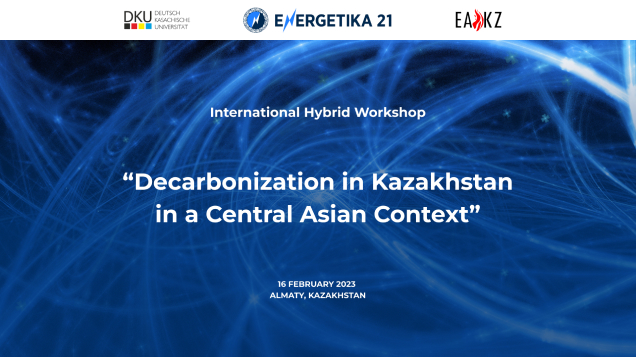The International Hybrid Workshop “Decarbonization in Kazakhstan in a Central Asian context” was held on 16 February 2023 in Almaty, Kazakhstan and served as a preparatory discussion towards the International Scientific Conference “Energetika 21: Economy, Ecology, Policy”. Arranged by St. Petersburg State University of Economics (UNECON) the workshop was held in Kazakh — German University (DKU) in cooperation with the Energy Aspects of Kazakhstan Analytical Centre (EAKZ).
More than 100 paricipants (over 60 offline and 40 online) attended the workshop. The workshop started with the welcoming words of the Vice-Rector of UNECON Dmitry Vasilenko, the President of Kazakh — German University prof. Wolrad Rommel, Vice-Minister for Energy of the Republic of Kazakhstan Zhanat Zhakhmetova and the Director of the Energy Aspects of Kazakhstan Analytical Centre Almaz Abildayev.
The previous workshop on 30 September 2022 already addressed the ambitious goals of Kazakhstan to reduce the GHG emissions by 2030 and the achievement of carbon neutrality by 2060. The first session of the workshop on 16 February 2023 deepened the discussion on reduction of GHG emissions in Kazakhstan. The expert of The World Bank Sandeep Kohli presented the “Insights from the WB on Kazakhstan Country and Climate Development Report”. Experts from the USA and Germany Michael Sipos and Ralf Dickel addressed the US approaches to CO2 sequestration and using CO2 for EOR. Several presentations were devoted to decarbonisation of various sectors – cement industry (Ali Abdelshafy, RWTH Aachen University), heat supply (Alexander Beliy, Kazakhstan Green Building Council and Jens Völler, Team Consult) and transport sector (Hamid Mostofi Darbani, TU Berlin).
The second session was focused on potential for cooperation between Kazakhstan and other countries in Central Asia. Such examples of cross border cooperation were presented by Dina Azhgalieva, Asian Development Bank Institute, Arsen Tleppaev, Kazakh-German University and Sergey Yelkin, USAID. The leading Russian expert on hydrogen policy Yuriy Melnikov presented the modern approaches to national hydrogen strategies.
The countries in Central Asia have complementarities in the energy sector and for renewable energy. On the other hand, there are conflicting interests regarding the use of water for power vs. irrigation. Contrary to many other regions, Central Asia does not have a river basin agreement with mechanisms to conciliate such conflicts. During vivid discussion moderated by the Independent adviser James Ball the contradictions and prospects of new projects were raised by Almaz Abildayev, EAKZ, Sandeep Kohli, The World Bank, Irina Mironova, European University at St. Petersburg and Kamilia Irgebaeva, National Institute of Strategic Analysis, Kyrgyzstan.
This was one of the three planned workshops for this year. The next one will take place in Baku, Azerbaijan in the middle of May.















